Customer Service Associates are the frontline ambassadors for your company, often being the first point of contact for customers. They play a crucial role in ensuring customer satisfaction and loyalty.
This role requires a blend of skills including strong communication abilities, patience, and problem-solving. These skills help associates manage inquiries and complaints effectively, ensuring a positive experience for the customer.
Candidates can write these abilities in their resumes, but you can’t verify them without on-the-job Customer Service Associate skill tests.
In this post, we will explore 8 essential Customer Service Associate skills, 10 secondary skills and how to assess them so you can make informed hiring decisions.
Table of contents
8 fundamental Customer Service Associate skills and traits
The best skills for Customer Service Associates include Communication Skills, Problem Solving, Product Knowledge, Patience, Active Listening, Empathy, Adaptability and Tech Savviness.
Let’s dive into the details by examining the 8 essential skills of a Customer Service Associate.
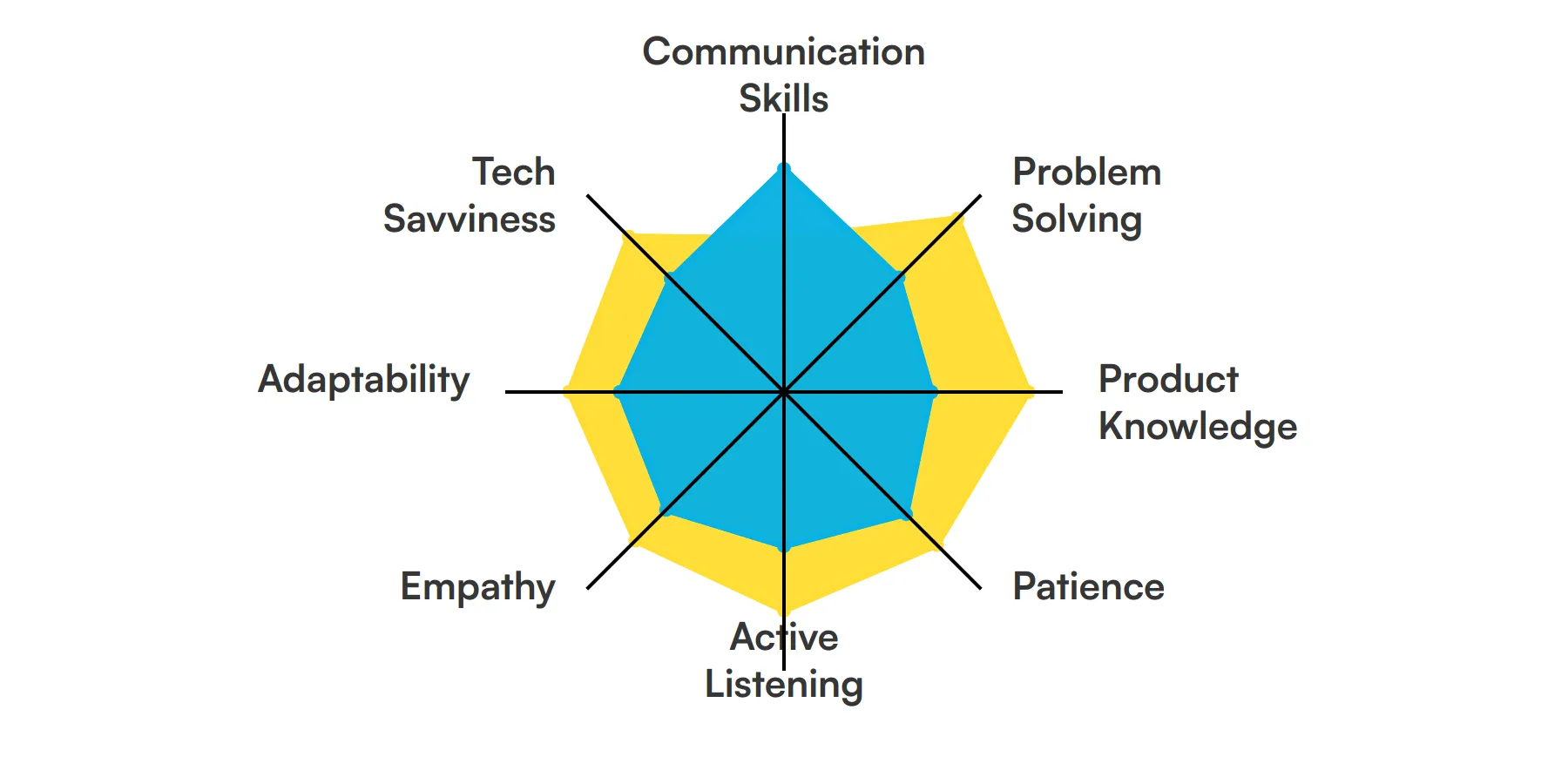
Communication Skills
Effective communication is key for a Customer Service Associate as it involves explaining solutions, answering queries, and conveying company policies clearly to customers. This skill ensures that information is relayed accurately and misunderstandings are minimized.
Problem Solving
Customer Service Associates must quickly identify the core issues presented by customers and think through logical solutions. This skill is crucial in resolving complaints efficiently and ensuring customer satisfaction.
Check out our guide for a comprehensive list of interview questions.
Product Knowledge
In-depth knowledge of the product or service being offered is essential. This allows the associate to provide accurate information and support, enhancing the overall customer experience.
Patience
Dealing with customers requires patience, especially when handling complaints or explaining complex issues. A patient associate can manage customer interactions more smoothly and maintain a positive company image.
Active Listening
Active listening involves fully concentrating on what is being said rather than just passively hearing the message. This skill helps Customer Service Associates understand the customer’s needs and respond appropriately.
Empathy
Understanding and sharing the feelings of another is vital in customer service. Empathy helps build a connection with the customer, fostering loyalty and trust.
Adaptability
Customer Service Associates often face unpredictable situations and diverse customer personalities. Adaptability allows them to handle changes or surprises with ease, ensuring consistent service quality.
Tech Savviness
Proficiency in using customer service software and tools is necessary for efficiency. This skill ensures that Customer Service Associates can manage multiple queries across various platforms seamlessly.
For more insights, check out our guide to writing a IT Specialist Job Description.
10 secondary Customer Service Associate skills and traits
The best skills for Customer Service Associates include Time Management, Conflict Resolution, Attention to Detail, Multitasking, Cultural Awareness, Data Entry Skills, Persuasion Skills, Stress Management, Team Collaboration and Continuous Learning.
Let’s dive into the details by examining the 10 secondary skills of a Customer Service Associate.
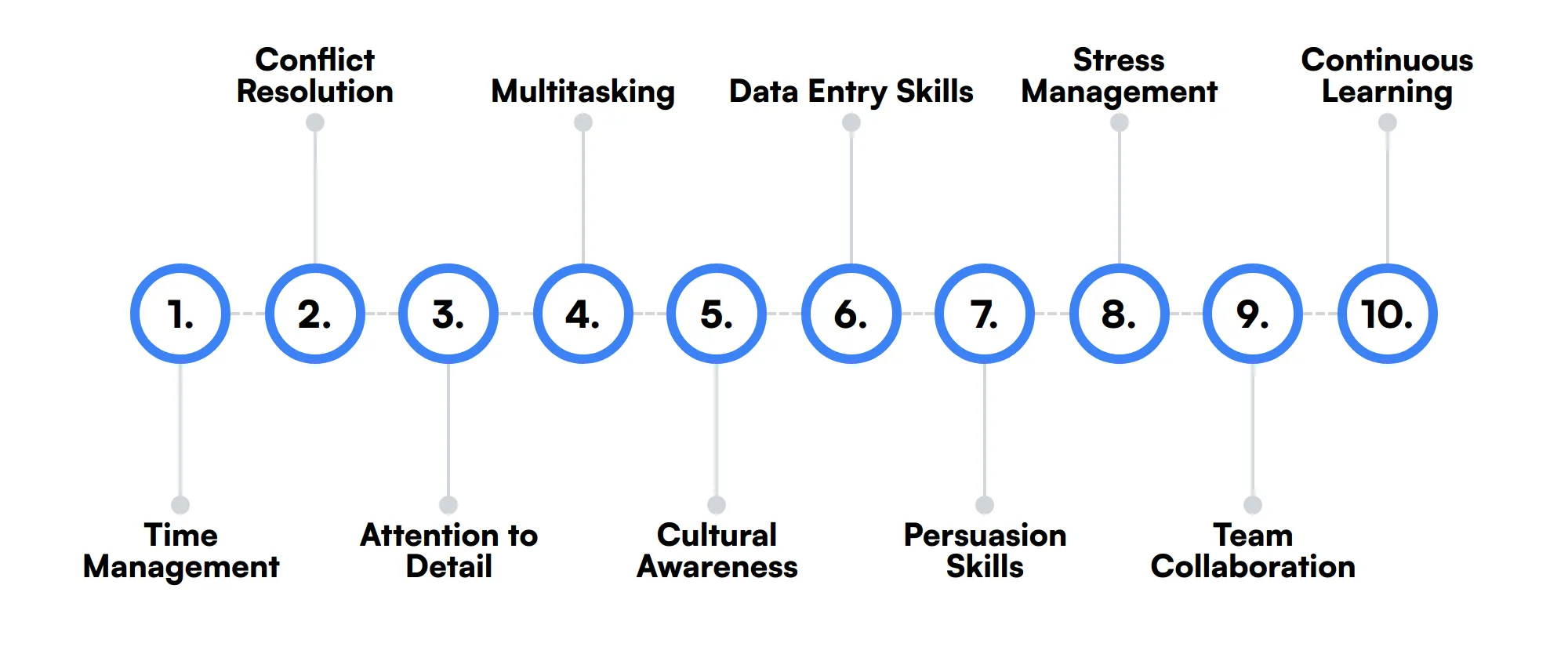
Time Management
Balancing multiple customer interactions and responsibilities requires effective time management to ensure that all customers receive timely support.
Conflict Resolution
The ability to peacefully resolve disputes and prevent escalation is important in maintaining a positive customer relationship.
Attention to Detail
Paying close attention to the details of customer interactions can prevent errors and enhance service delivery.
Multitasking
Handling multiple tasks at once, such as chatting with a customer while updating records, is a common requirement for Customer Service Associates.
Cultural Awareness
Understanding and respecting cultural differences ensures that communication is appropriate and respectful across diverse customer bases.
Data Entry Skills
Accurate and efficient input of customer information into databases is crucial for maintaining up-to-date and accessible customer records.
Persuasion Skills
Effectively persuading customers, especially when upselling services or handling objections, can enhance customer retention and increase sales.
Stress Management
The ability to manage stress effectively ensures that Customer Service Associates can maintain composure and professionalism, even under pressure.
Team Collaboration
Working well with others, especially in a team-oriented environment, is important for a cohesive customer service strategy.
Continuous Learning
The willingness to continuously learn and update one’s skills is important in keeping up with product changes and improving service techniques.
How to assess Customer Service Associate skills and traits
Assessing the skills and traits of a Customer Service Associate can be a challenging task. While resumes and interviews provide some insights, they often fall short in revealing the true capabilities of a candidate. Skills-based assessments offer a more reliable way to evaluate a candidate's proficiency in key areas such as communication, problem-solving, and empathy.
To ensure you are hiring the best talent, it's important to use a combination of methods to assess these skills. This includes practical tests, role-playing scenarios, and behavioral interviews. For instance, Adaface assessments can help you achieve a 2x improved quality of hires by focusing on real-world skills and reducing screening time by 85%.
When evaluating Customer Service Associates, consider their ability to communicate effectively, solve problems, and demonstrate patience and empathy. Active listening and adaptability are also crucial traits that can be assessed through various methods. By leveraging these tools, you can make more informed hiring decisions and build a stronger customer service team.
Let’s look at how to assess Customer Service Associate skills with these 3 talent assessments.
Communication Skills Test
Communication Skills Test evaluates a candidate's ability to communicate effectively in various professional scenarios. It measures verbal and written communication skills, active listening, and interpersonal abilities, crucial for customer service roles.
The test assesses candidates on their situational judgement, attention to detail, critical thinking, and verbal reasoning. It challenges them to handle real-world communication scenarios, demonstrating their ability to process information and respond appropriately.
Candidates who perform well on this test demonstrate a strong ability to convey information clearly and effectively, manage conversations, and maintain professionalism in customer interactions.
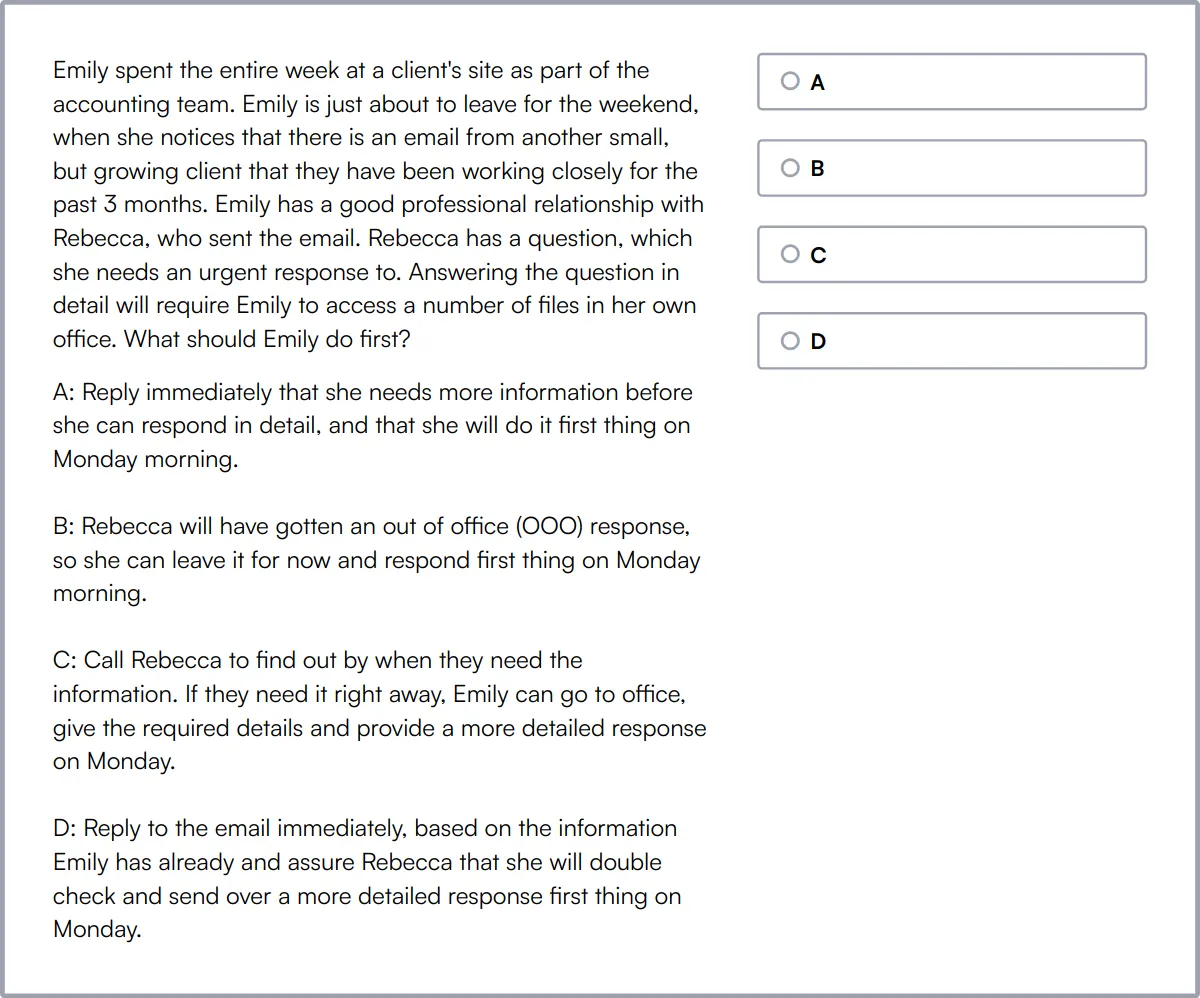
Problem Solving Test
Problem Solving Test measures a candidate's ability to analyze data, understand instructions, and solve complex problems. It provides insights into their problem-solving skills and their capacity to adapt and learn quickly.
This test evaluates abstract reasoning, critical thinking, deductive reasoning, inductive reasoning, and pattern matching. Candidates are presented with logical and spatial reasoning challenges that simulate real-life problem-solving situations.
High-scoring individuals in this test are typically adept at breaking down complex problems into manageable parts and finding efficient solutions, which is key in dynamic customer service environments.
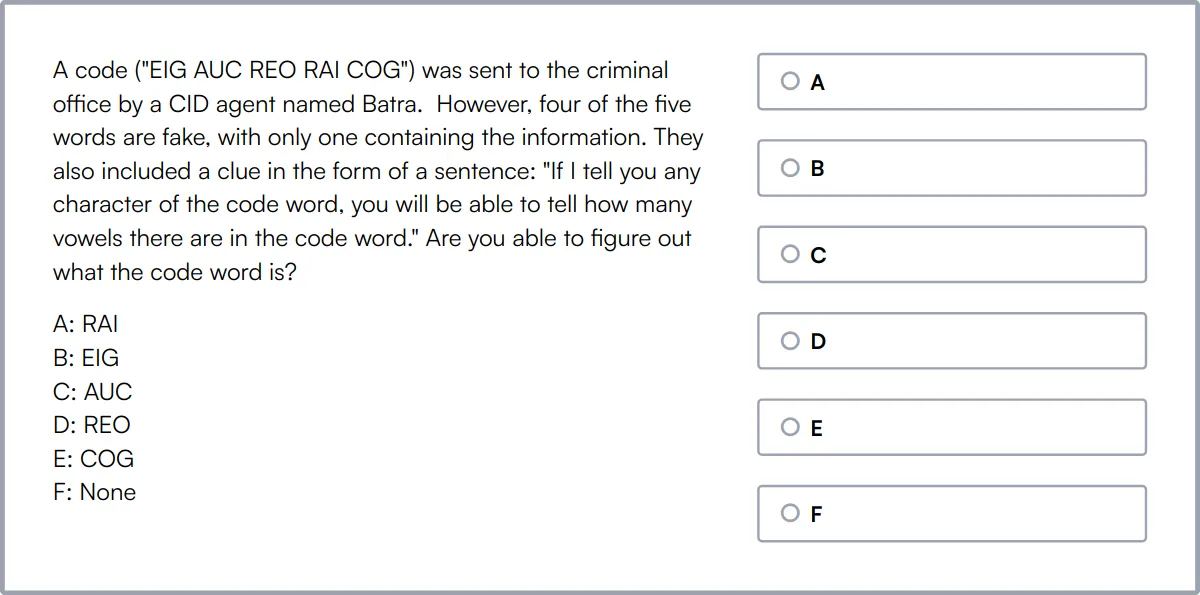
Technical Support Test
Technical Support Test assesses a candidate's knowledge in IT infrastructure, including operating systems, networking, and IT service protocols. It also evaluates their troubleshooting skills and ability to communicate technical solutions effectively.
The test covers a wide range of technical skills such as database management, scripting languages, cybersecurity principles, and incident reporting. It includes situational judgement questions to assess problem-solving and customer service skills in technical support scenarios.
Candidates excelling in this test demonstrate a comprehensive understanding of technical support fundamentals and the ability to handle real-world IT issues while maintaining excellent customer service.
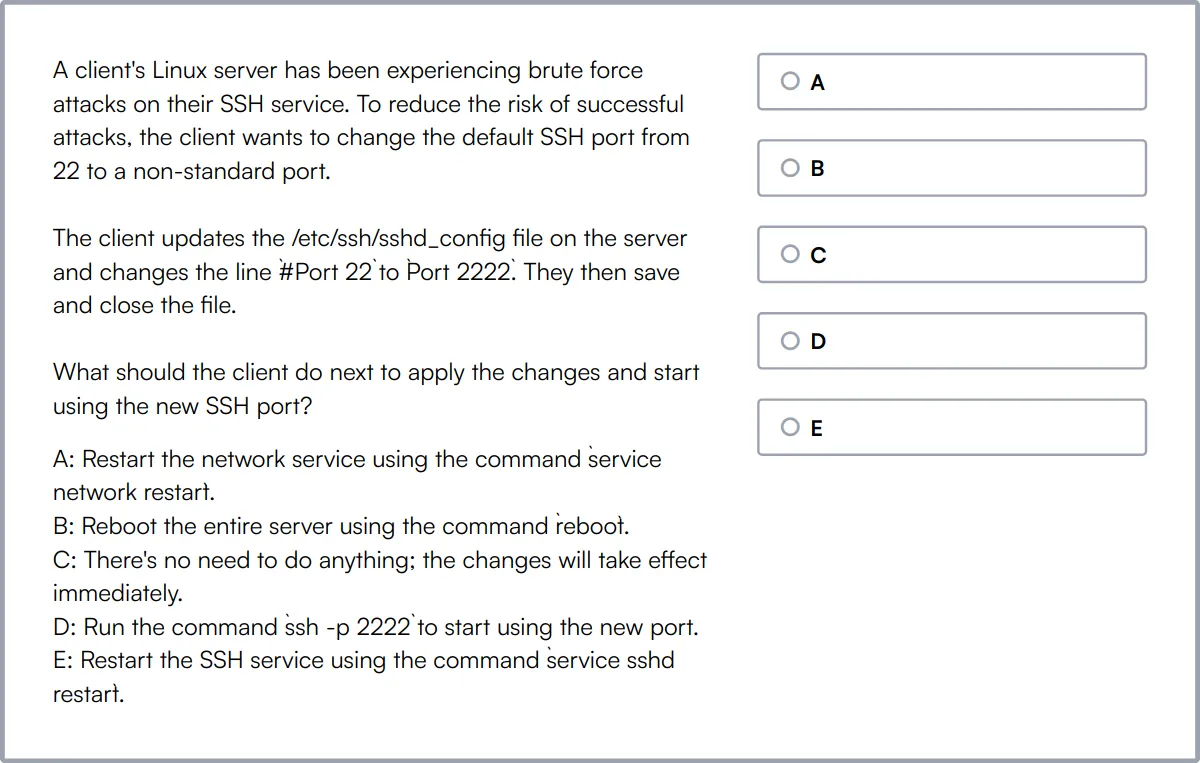
Summary: The 8 key Customer Service Associate skills and how to test for them
| Customer Service Associate skill | How to assess them |
|---|---|
| 1. Communication Skills | Evaluate clarity and effectiveness in verbal and written exchanges. |
| 2. Problem Solving | Assess ability to analyze issues and generate solutions. |
| 3. Product Knowledge | Test knowledge of product features, uses, and benefits. |
| 4. Patience | Observe reactions under prolonged service interactions. |
| 5. Active Listening | Check for understanding and responsiveness during conversations. |
| 6. Empathy | Notice the consideration for customer emotions and perspectives. |
| 7. Adaptability | Simulate varied scenarios to test response to change. |
| 8. Tech Savviness | Examine proficiency with digital tools and platforms. |
Customer Service Aptitude Test
Customer Service Associate skills FAQs
How can you assess communication skills in a Customer Service Associate?
To assess communication skills, consider role-playing scenarios during interviews to evaluate how candidates handle typical customer interactions. Review their clarity, tone, and ability to convey information effectively.
What techniques can be used to evaluate problem-solving abilities in customer service candidates?
Use situational judgment tests that present candidates with specific challenges they might face on the job. Observe their approach to solving these problems and their ability to think logically under pressure.
Why is empathy important in customer service roles?
Empathy allows associates to connect with customers on a personal level, understand their concerns, and provide more thoughtful and tailored responses. This skill can lead to higher customer satisfaction and loyalty.
How can recruiters test for adaptability in customer service applicants?
Consider asking candidates about times they adapted to significant changes at work. Alternatively, simulate a rapidly changing situation in a role-play to see how they handle unexpected challenges.
What role does tech savviness play in customer service?
Tech savviness is important for efficiently navigating CRM software, handling data entry, and using communication tools. This skill ensures quick and accurate service, enhancing overall customer experience.
How can time management skills be assessed during the hiring process?
To evaluate time management, ask candidates how they prioritize daily tasks or handle high volumes of customer queries. Time management exercises or tests can also provide insights into their abilities.
What is the importance of cultural awareness in customer service?
Cultural awareness helps associates respect and understand diverse customer backgrounds, which can improve communication and reduce misunderstandings, leading to better customer relations.
How can continuous learning be encouraged among Customer Service Associates?
Encourage continuous learning by providing regular training sessions, access to new resources, and opportunities for professional development. This keeps associates updated on best practices and emerging trends.

40 min skill tests.
No trick questions.
Accurate shortlisting.
We make it easy for you to find the best candidates in your pipeline with a 40 min skills test.
Try for freeRelated posts
Free resources



